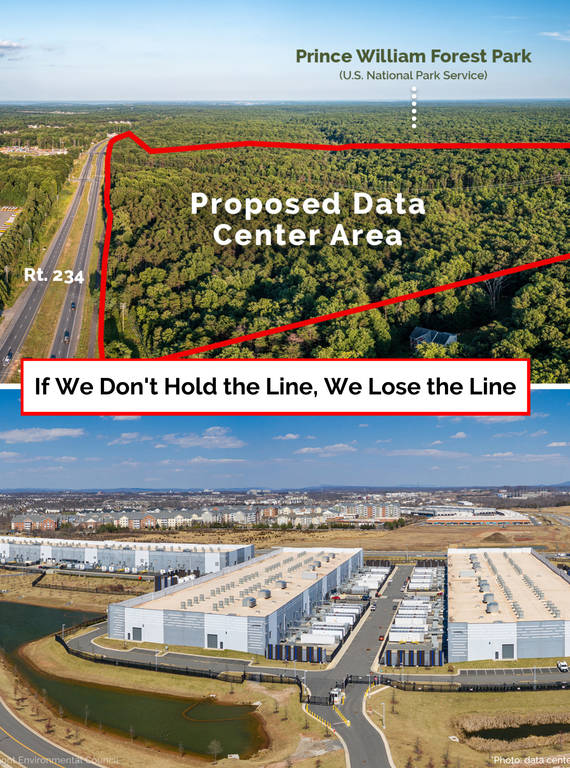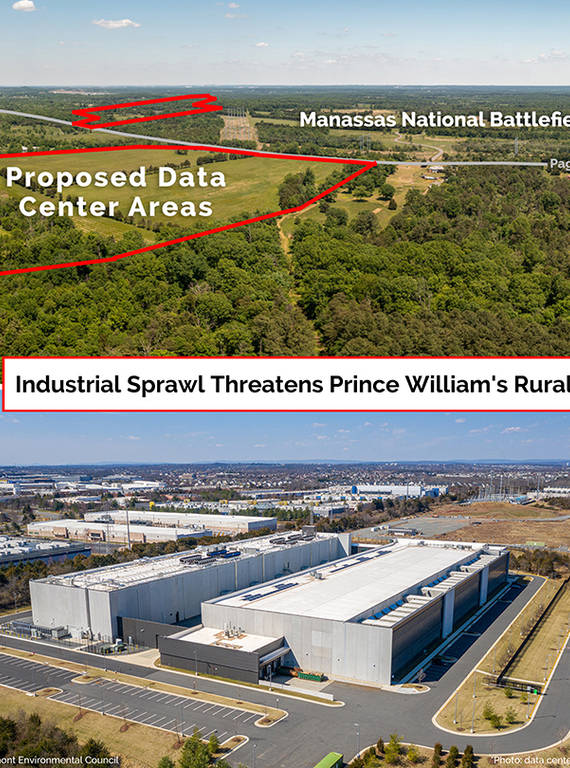New developments could compromise the environmental integrity of several national parks in Virginia, including Prince William Forest Park, Manassas National Battlefield, Wilderness Battlefield, and more.
The construction of industrial data centers is one of the fastest growing threats to national parks in the Mid-Atlantic region. These massive, noisy, industrial buildings are being proposed throughout Virginia adjacent to national parks, creating intensive industrial intrusion of historic landscapes and extreme amounts of noise, water, and air pollution. National Parks Conservation Association is a leader in urging local governments to site these facilities properly, in existing industrial areas, and working to protect water and air quality during and following construction.
What Are Data Centers?

A visualization of the affected land at Prince William Forest Park and how it could change if the county allows data centers on adjacent land.
Courtesy of the Piedmont Environmental CouncilData centers are industrial complexes that house large amounts of computer systems for storing virtual information, also known as “the cloud.”. Massive infrastructure must be built to support these complexes, including transmission, water and sewer lines, new roads, and more. Data centers are slated to account for a fifth of the world’s electricity usage by 2025 but will likely be higher in the Mid-Atlantic region. In 2020, data centers consumed an estimated 174 billion gallons of water — a 15-megawatt data center can use up to 360,000 gallons of water a day. More than 70% of the world’s internet traffic runs through Northern Virginia, meaning an outsized amount of these impacts fall on local communities and parks in the area.
Historically, data centers have been properly zoned near existing industrial areas, such as Dulles Airport. This planning was done intentionally to develop land where data centers would be minimally invasive to both residents and the surrounding environment. This smart planning protected our national parks and visitors from these massive structures for years.
How Are the Proposed Data Centers Threatening National Parks?

A visualization of the affected land at Manassas National Battlefield Park and how it could change if the county allows data centers on adjacent land.
Courtesy of the Piedmont Environmental CouncilRecently, however, data center developers have begun targeting rural land outside of industrial areas, often adjacent to national parks, for large data center developments. This has created a growing conflict between protecting national parks and this rapidly growing industry. In March 2021, the Prince William County Board of Supervisors voted to add about 60 acres within the congressionally authorized boundary of Prince William Forest to the data center overlay district. A congressionally authorized boundary encompasses all the land within a certain area that could one day become national parkland. This proposal is a direct threat to potential parkland, as well as downstream water quality in the park.
Manassas National Battlefield is under similar threat. In May 2021, numerous landowners approached the Prince William Board of Supervisors with a proposal to add their rural agricultural land to the data center overlay district on a road that directly borders the western edge of the park. This proposal encompasses more than 2,100 acres and would add more than 27 million square feet of data centers to the gates of Manassas Battlefield – the equivalent of more than 150 Wal-Mart Supercenters. This would mean that a sprawling swath of warehouses could be approved for development directly adjacent to the site of two historic Civil War battles. Of the proposed 2,100 acres, 107 are designated as “core battlefield areas,” where combat occurred during the Battles of Manassas. Another one of these farms is a Nationally Registered Historic Site due to its significance during the Civil War. This is simply the wrong site for a massive, industrial development. Despite opposition from dozens of environmental and historic preservation groups, the Prince William Board of Supervisors has consistently voted to advance these two proposals.
Is That a Data Center in the Fields?
How proposed data center development in Prince William County’s Rural Crescent threatens the place we love
See more ›Other data center developments have been proposed near Wilderness Battlefield, a portion of the Fredericksburg & Spotsylvania National Military Park and North Anna Battlefield, a portion of the Richmond National Battlefield Park. Both of these proposals plan to build millions of square feet of new data centers to existing rural land near these parks. Due to its size and growth, NPCA expects new data center developments to continue to arise near national parks and other historic sites in the near future.
Each of these proposals threaten these parks with an intrusive industrial skyline, large amounts of noise generated by years of heavy construction and the data centers themselves.
A Simple Solution
NPCA recognizes the unavoidable necessity of data centers. However, we do not want to see these massive developments directly adjacent to our national parks. Virginia and the Mid-Atlantic region as a whole have ample existing industrial land to build data centers. There is no need to destroy historic viewsheds, raze wildlife habitat and degrade the integrity of our national parks when plenty of land is appropriate and available for development.
There are several simple solutions that NPCA is pursuing at all levels of government to protect parks from the threat of data centers. First, NPCA is actively working with local governments and planning offices around the region to ensure that data centers are built in appropriate areas and are upheld to the strongest water quality and climate standards possible. We are also advocating at the state level for common-sense restrictions on data center development near national parks, including a ban of new data centers from being constructed within one mile of national park sites. We will also continue to advocate in Virginia for a statewide study of the impacts of data centers on national parks, water quality, our climate goals, and more. Finally, we continue to advocate in Congress for the protection of national parks from intrusive industrial development, especially within the congressionally authorized boundary of a park.
Get Action Alerts
Want national parks in your inbox? Sign up for NPCA email updates to receive news, features, and opportunities to make a difference! You can unsubscribe at any time.